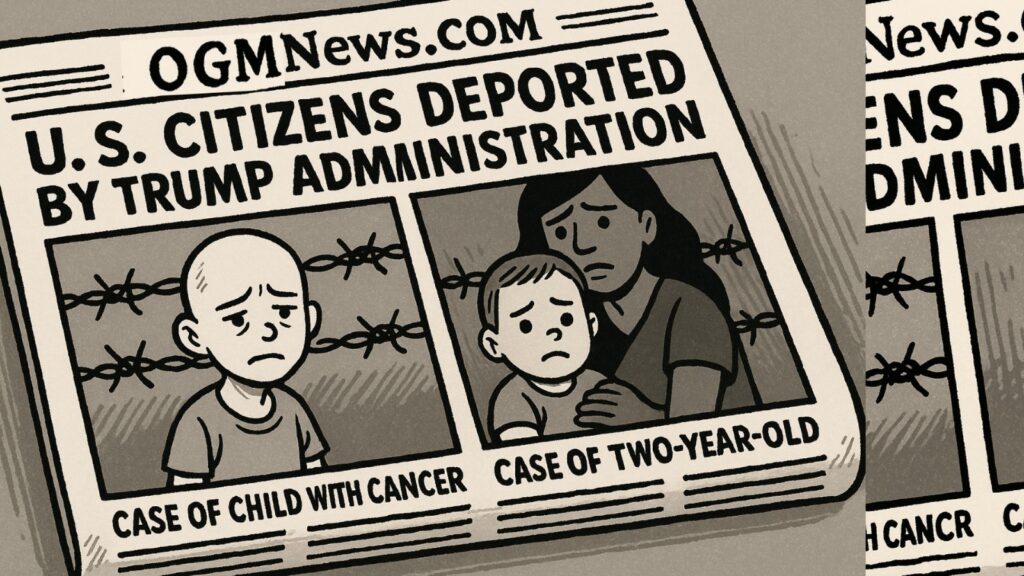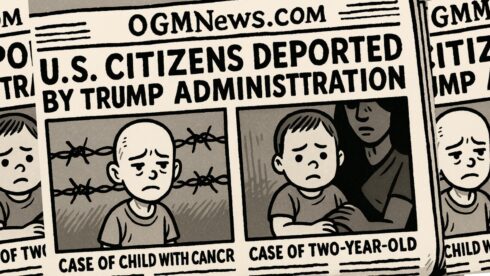The Trump Administration is under intense scrutiny following revelations of deportation of at least four U.S. citizen children alongside their undocumented parents. Legal experts and human rights advocates have highlighted two particularly alarming cases that expose significant due process violations and constitutional breaches.
Among the deported children, one is a cancer patient in critical need of medical care, and another is a two-year-old girl removed from the U.S. despite active legal petitions to keep her stateside. These cases raise urgent questions about how immigration policies are implemented — and the human cost of those policies when constitutional rights are ignored.
Deportation of A Two-Year-Old Without Due Process
In April 2025, a two-year-old U.S. citizen, identified only as V.M.L., was deported to Honduras along with her undocumented mother and sibling. This action occurred even as the child’s U.S. citizen father fought in court to prevent her removal. U.S. District Judge Terry Doughty, overseeing the case, sharply criticized the deportation, pointing out the lack of meaningful legal review before the removal.
Immigration and Customs Enforcement (ICE) presented a handwritten note, allegedly showing the mother’s consent to take her daughter with her. However, the judge expressed serious doubts about its validity and sufficiency under the law. A court hearing scheduled for May 16 will further investigate whether the child’s rights were violated and whether the deportation should be reversed.
Deportation of a Cancer Patient Child Without Treatment

The same day V.M.L. was deported, ICE also removed a four-year-old U.S. citizen battling Stage 4 metastatic cancer. The child was taken out of the country without her medication, treatment plan, or access to her American doctors, placing her life in immediate danger. According to legal representatives, this deportation not only defied basic human compassion but also blatantly violated the child’s constitutional due process rights.
ICE insists that the mother voluntarily chose to take her child with her. However, lawyers argue that informed, voluntary consent under such stressful and coercive circumstances is highly questionable. The deportation has drawn condemnation from medical ethics groups, pediatricians, and legal scholars, all warning of the severe and irreversible harm this decision could inflict on the child’s health.
Immigration Policy Changes Targeting Medically Vulnerable
These deportations are not isolated incidents but part of a broader shift in immigration policy under the Trump administration. In 2019, the administration attempted to dismantle the “medical deferred action” program, which had allowed immigrants with serious health conditions to remain in the U.S. for life-saving treatments.
The abrupt termination of this program provoked national outrage and a series of lawsuits, forcing the administration to eventually reinstate it. However, advocates warn that ongoing practices indicate a systemic disregard for vulnerable populations, suggesting that even U.S. citizen children with dire medical needs are not guaranteed protection under current immigration enforcement tactics.
Constitutional Crises Emerging from Executive Overreach
The deportation of U.S. citizen children without adequate due process symbolizes a growing constitutional crisis in America. Central to this crisis is the failure of Congress to exercise its role as a check on executive power, allowing the executive branch to bypass legal safeguards intended to protect citizens’ rights.
Legal scholars emphasize that the Constitution guarantees due process to every citizen, regardless of age. Deporting children without fair hearings undermines the rule of law and erodes constitutional protections that are meant to be inviolable. If allowed to stand, these actions set dangerous precedents that could embolden future abuses of executive authority.
Vulnerable Populations as Political Casualties
Without strong Congressional oversight, vulnerable groups — including young children, sick patients, and families fleeing violence — risk becoming political casualties in the name of “tougher” immigration enforcement. Human rights organizations argue that these practices not only violate domestic laws but also tarnish America’s international reputation as a defender of liberty and human dignity.
Critics warn that ignoring the rights of the most vulnerable can have ripple effects across society. If sick children can be deported without recourse today, what protections will exist for other citizens facing government overreach tomorrow? The moral and legal stakes could not be higher.
Erosion of Public Trust and Democratic Norms
The repeated failure to safeguard constitutional rights in immigration enforcement weakens public trust in democratic institutions. Citizens increasingly question whether the government will uphold their rights impartially, which can foster disillusionment, division, and political instability.
Moreover, unchecked executive actions risk permanently altering democratic norms. Every violation of due process that goes unpunished further erodes the bedrock principles of American democracy, making it harder for future leaders to restore the checks and balances that protect all citizens. Experts urge Congress to act swiftly to reinstate rigorous oversight before more irreparable damage is done.














